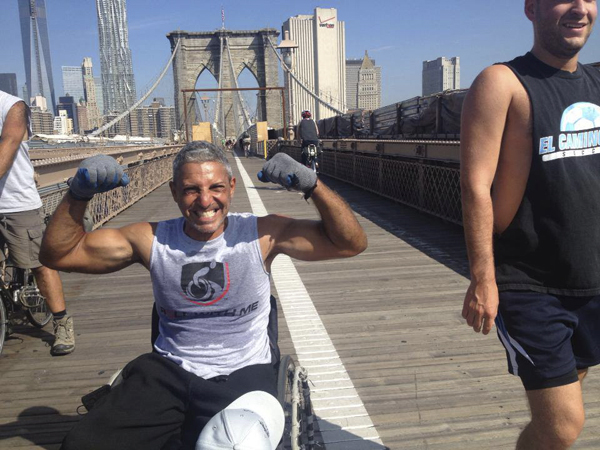The rousing Roll with Me, which screened at the recent Slamdance Film Festival, centers on Gabriel Cordell, who one fateful day in 1992 was involved in a traffic accident that left him without the use of his legs. After a drug-fueled, self-destructive spiral that lasted for years, the one-time aspiring actor finally sobered up at the age of 42. Needing a goal to strive for, he decided to make history as the first person to roll across the United States in a no-frills wheelchair.
From the outset, the documentary makes viewers empathize with Cordell, capturing how simply getting in a wheelchair or into his car is a struggle. These early scenes also hint at just how tough his quest is going to be: Cordell is not an athlete, and his mission will require crossing 3,100 miles and overcoming considerable elevation. He receives a clean bill of health from his doctors, but with a warning that any serious shoulder injuries could mean the loss of his independence; it’s a risk that the film constantly reminds us about.
Luckily for Cordell, the filmmakers will be actively involved in his mission. Director Lisa France and the members of her small team introduce themselves to viewers, and almost immediately reveal that each has specific medical, psychological, and emotional issues. They each got involved in the project because something about Cordell’s story inspires them. However, that doesn’t stop them from constantly bickering. An additional wild card is Cordell’s nephew Chris, a troubled young man who recently exited rehab for drug use.
As they set out from Santa Monica to reach New York, the team and their subject can only cover, at most, 40 miles in a day, yet the film moves at a brisk pace. Most of the on-the-road footage consists of shots of Cordell, willing himself onward despite setbacks that at one point include a shoulder injury. Roll with Me can be considered a sports movie, but in this case, the subject’s main opponent is not another competitor but himself. The suspense is in whether Cordell’s body can hold up under tremendous duress long enough to reach his destination.
Yet there are also all sorts of triumphant moments: Cordell’s reaching the 1,000-mile mark, or when the team thumbs its nose at the law by letting him roll himself along an interstate freeway. Scenes where he makes public appearances to promote his mission are among the most moving as Cordell comes across as genuinely humbled by how people embrace him.
As word about him spreads, more people come out to the roadside at various points with donations of food, water, or gloves, or just to thank him for raising awareness of people with disabilities. Their actions clearly move Cordell, who over the course of the film transforms before our very eyes, from someone who cut himself off from all human contact into a man of the people.
At the same time, the filmmakers wisely refrain from making their subject into too much of a martyr, even if there are countless scenes of the crew talking about his leadership abilities and how he’s become the father figure of their makeshift family. Cordell also has his moments where he seems unnecessarily brusque and frequently tough on his nephew.
The earnest score, which contains its share of instrumental music seemingly designed to get fists pumping, can be a little too insistent at times. We also don’t really spend enough time with the members of France’s crew individually to get to know any of them very well, which makes the surrogate-family angle slightly less satisfying than it could be. Nevertheless, Cordell’s story is unquestionably inspiring, and in a world in which no less than the American president ridicules persons with disabilities, the sight of someone in a wheelchair willing himself into the record books becomes vital viewing.







Leave A Comment